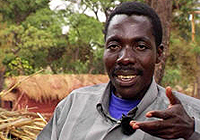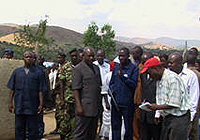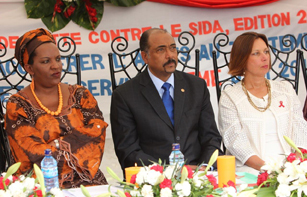
Noe Sebisaba and his STOP SIDA NGO are helping to mitigate the impact of HIV in Burundi
Courtesy of UNHCR
Noe Sebisaba knows how to turn an adverse situation into something life-affirming. In 1996 he and his family were forced to flee a Burundi in turmoil and ended up in the Kanembwa refugee camp in Tanzania. While in the camp, in 1998, he discovered that he was living with HIV. His wife, who was also HIV positive, died of an AIDS-related illness. On World AIDS Day 2001, at an event organized by the UN refugee agency UNHCR, Mr Sebisaba decided to openly declare his own HIV status, the first known African refugee to do so. He has never looked back. As he says, “I decided to let HIV know; ‘I’ll control you, you’re not going to control me’…I was tired of silence and I found a new reason to live. To challenge HIV and preach forgiveness and love.”
Although initially rejected by his family and community, the disclosure helped galvanize him to challenge the stigma and discrimination rampant among refugees and the host population in Tanzania. He developed a grassroots, community organization, STOP SIDA (STOP AIDS), to intensify the involvement of refugees and the local community in the AIDS response and to disseminate HIV awareness messages at public events, through individual contacts, visits and peer groups.
With my decision to say openly that I’m living with HIV, I’ve done my part to try to change the face of the virus. I think I’ve shown that it’s not an automatic death sentence and that you can still lead a rich life.
Noe Sebisaba founder of STOP SIDA
Active in a number of camps across western Tanzania, STOP SIDA distributed educational materials and advocated support and care for those infected with and affected by the virus. Using himself as an example, Mr Sebisaba found a unique way to help individuals and communities become agents of change in challenging HIV. And he was able to confront some of the particular vulnerabilities faced by refugees whose lives have been uprooted due to conflict, persecution or violence.
There are myriad factors that can increase the vulnerability to HIV of the many millions of refugees and internally displaced people around the world. They often lose their source of income and may have to resort to high-risk behaviour to satisfy their needs. Health and education services often lapse and sources of information on HIV prevention and treatment provision can be disrupted. Social and sexual norms, networks and institutions can also break down and women can be especially vulnerable as rape is often used as a weapon of war during conflicts. In fact, Mr Sebisaba’s wife was herself raped by soldiers in Burundi during the civil war.
The fact that STOP SIDA was able to have an impact in Tanzania was a testament to Mr Sebisaba and his partners’ will and determination. He showed that refugees are not only passive recipients of aid but have powerful coping mechanisms, resilience and ingenuity. Many refugees and members of the surrounding communities participated in STOP SIDA activities and there was a marked increase in take-up of voluntary counseling and testing.

Burundi’s President Pierre Nkurunziza visits STOP SIDA
Courtesy: Noe Sebisaba
In 2005 Mr Sebisaba was repatriated to Burundi by UNHCR and was able to continue his work. In the last seven years the agency has helped nearly 500,000 Burundians return home and supports their continued access to treatment and HIV prevention programmes.
Since 2006, STOP SIDA-NKEBURE UWUMVA has operated in the country, especially in areas with a large number of returnees. Supported by UNHCR and other partners, with offices in the capital Bujumbura and the eastern Cankuzo province, the NGO continues to spread the message of prevention, behaviour change, tolerance and the need for voluntary counseling and testing. Outreach has been especially important in rural areas where AIDS information and anti-stigma messaging find it difficult to penetrate.
In addition, STOP SIDA has become an implementing partner of UNHCR in three camps for Congolese refugees in Burundi where staff use their expertise and experience to help mitigate the impact of the epidemic, including ensuring that clients can receive drug treatment from local hospitals.
Some 450,000 people, both former refugees and those who stayed behind, are being reached by STOP SIDA activities in the eastern provinces of Cankuzo and Ruyigi. In the Congolese camps and surrounding communities some 25,000 are benefiting from the NGO’s initiatives.
UNHCR, the lead UN agency for challenging HIV among refugees and internally displaced people, has co-produced a video about the organization called Love in the time of AIDS, which will be featured during the UNAIDS Programme Coordinating Board thematic session on forced displacement at the Board’s 24th meeting on June 22 to 24. STOP SIDA is highlighted as a best practice of community leadership and mobilization.
What gives Mr Sebisaba the most satisfaction is the feeling that he and his fellow activists have been able to help people accept a positive HIV diagnosis with a degree of hope and optimism and have encouraged people to talk about the epidemic.
“With my decision to say openly that I’m living with HIV, I’ve done my part to try to change the face of the virus. I think I’ve shown that it’s not an automatic death sentence and that you can still lead a rich life. Where I’ve worked, people have been more able to talk openly about having HIV and more people are getting tested. I never have a moment’s regret about disclosing my status. I think it’s really making a difference.”









